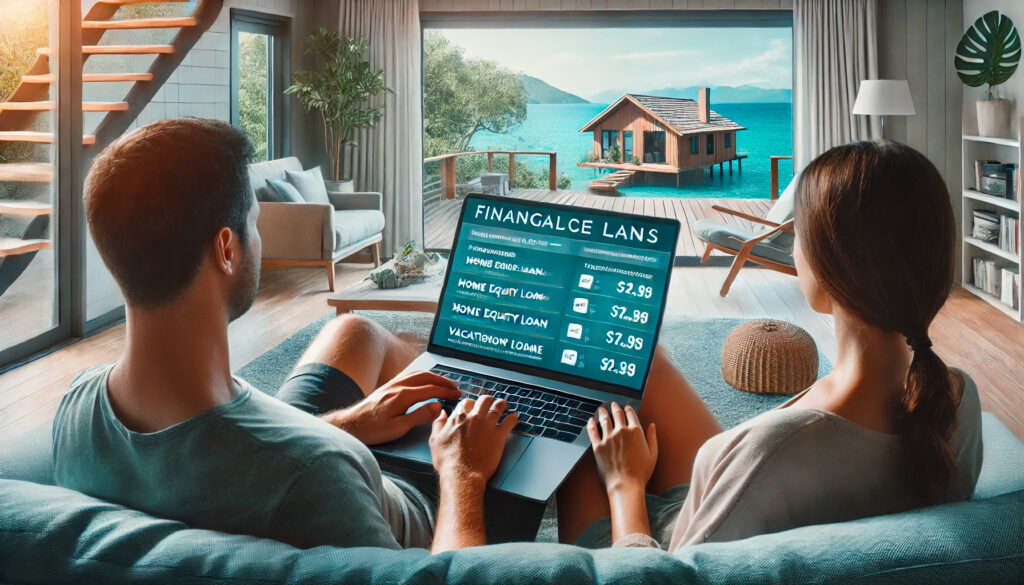
Owning a vacation home is a dream for many, offering a personal retreat and the opportunity to create lasting memories with family and friends. However, financing a vacation property requires careful planning and understanding of available options to make the process seamless and financially sustainable.
This guide explores how to finance your dream getaway, from selecting the right mortgage to leveraging creative financial strategies. By understanding the unique aspects of purchasing a vacation home, you can make informed decisions and turn your dream into reality.
Understanding the Basics of Vacation Home Financing
Vacation home financing differs from primary residence mortgages in several key ways. Lenders often view vacation properties as higher-risk investments, as they assume borrowers may prioritize payments on their primary home in financial hardships. As a result, interest rates and down payment requirements for vacation homes tend to be higher than those for primary residences.
When financing a vacation home, you’ll typically need a strong credit score, a solid financial history, and proof of income to demonstrate your ability to manage the additional financial responsibility. Unlike primary home loans, which may allow for minimal down payments, most lenders require at least 10-20% upfront for vacation properties.
Choosing the Right Mortgage
Selecting the appropriate mortgage is critical to ensuring your vacation home remains a source of joy rather than financial stress. Fixed-rate mortgages offer stability with consistent monthly payments, making them a popular choice for those seeking predictability. On the other hand, adjustable-rate mortgages (ARMs) can provide lower initial payments, which may appeal to buyers planning to refinance or sell within a few years.
When comparing mortgage options, it’s essential to consider the loan term. Shorter terms, such as 15 years, often come with lower interest rates but higher monthly payments, allowing borrowers to build equity faster. Longer terms, like 30 years, provide more manageable payments but result in higher interest costs over time.
Working with a mortgage advisor familiar with vacation property financing can help you navigate these options and select the one that best aligns with your financial goals.
Exploring Alternative Financing Options
For some buyers, traditional mortgages may not be the ideal solution for financing a vacation home. Alternative options, such as home equity loans, personal loans, or cash-out refinancing, can provide the flexibility needed to make the purchase.
Home equity loans and lines of credit (HELOCs) allow homeowners to tap into the equity in their primary residence to finance a vacation property. These options often come with competitive interest rates, making them an attractive choice for those with significant equity in their primary homes.
Personal loans offer another alternative, providing a lump sum without the need to use your primary residence as collateral. However, these loans typically come with higher interest rates and shorter repayment terms, making them best suited for smaller purchases or buyers with strong financial profiles.

Short-Term Rentals: An Income-Generating Strategy
One way to offset the costs of a vacation home is by renting it out when it’s not in use. Short-term rental platforms like Airbnb and Vrbo have made it easier than ever for homeowners to generate income from their properties. This additional revenue can help cover mortgage payments, property taxes, and maintenance costs, making vacation homeownership more financially viable.
However, before pursuing this strategy, it’s crucial to research local regulations and restrictions on short-term rentals. Some areas have strict rules or require permits, which could impact your ability to rent out the property. Additionally, consider the costs of managing rentals, such as cleaning, repairs, and advertising.
Tax Benefits and Considerations
Owning a vacation home can come with tax advantages, but these depend on how the property is used. If the home is solely for personal use, mortgage interest and property taxes may be deductible, similar to a primary residence. If you rent out the property, it may qualify as an income-generating asset, allowing for deductions on expenses such as maintenance, repairs, and utilities.
The distinction between personal use and rental use is important for tax purposes. For instance, if you rent the property for fewer than 15 days a year, the income may not need to be reported, but you won’t be able to deduct rental-related expenses. Consulting a tax professional can help you navigate these complexities and optimize your tax benefits.
Location and Market Research
The location of your vacation home plays a significant role in its value and appeal. Consider factors such as proximity to attractions, seasonal demand, and accessibility when choosing a property. For example, a beachfront property in a popular tourist destination may command higher rental rates and appreciate faster than a secluded cabin in a remote area.
Researching market trends is equally important. Understanding local real estate conditions, such as average property prices, growth potential, and rental demand, ensures that your investment aligns with your financial goals. Working with a local real estate agent familiar with vacation properties can provide valuable insights and help you identify opportunities in competitive markets.
Budgeting for Ongoing Costs
Beyond the purchase price, vacation homeownership comes with ongoing expenses that need to be factored into your budget. These include property taxes, insurance, maintenance, utilities, and potential homeowners’ association (HOA) fees. In areas prone to natural disasters, such as hurricanes or wildfires, additional insurance coverage may be required, further increasing costs.
To avoid financial strain, it’s essential to account for these expenses when determining how much you can afford to spend on a vacation home. Setting aside funds for unexpected repairs or seasonal maintenance, such as winterizing the property, ensures that your getaway remains a haven rather than a source of stress.
Financing a Vacation Home Abroad
For those looking to purchase a vacation home in another country, financing options and considerations become more complex. International buyers may face additional hurdles, such as higher interest rates, stricter loan requirements, and currency exchange risks. Working with an international mortgage specialist or considering local financing options can simplify the process and help you navigate these challenges.
Additionally, understanding local property laws, taxes, and ownership regulations is crucial for ensuring a smooth transaction. Consulting with a legal expert familiar with international real estate can provide peace of mind and protect your investment.
Conclusion: Realizing Your Dream Getaway
Financing a vacation home requires a thoughtful approach and a clear understanding of the available options. From traditional mortgages to creative strategies like short-term rentals and home equity loans, there are multiple paths to making your dream getaway a reality.
By carefully evaluating your financial situation, researching the market, and working with knowledgeable professionals, you can make confident decisions that align with your goals. Whether you’re looking for a serene retreat or an income-generating property, owning a vacation home can be a rewarding experience that enhances your lifestyle and builds long-term value.
